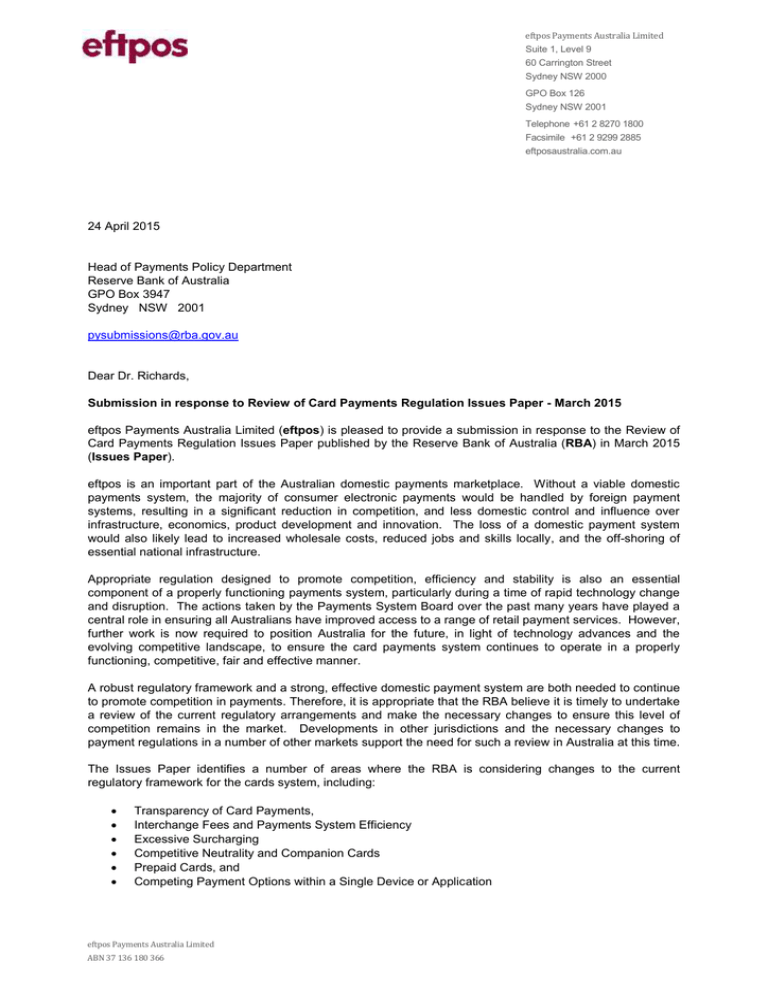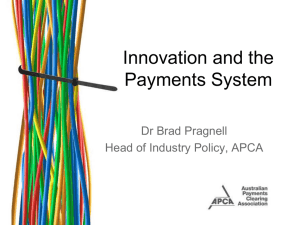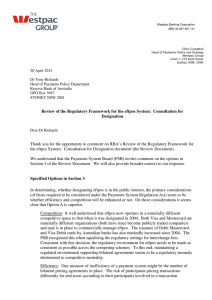Document 10842397
advertisement

eftpos Payments Australia Limited Suite 1, Level 9 60 Carrington Street Sydney NSW 2000 GPO Box 126 Sydney NSW 2001 Telephone +61 2 8270 1800 Facsimile +61 2 9299 2885 eftposaustralia.com.au 24 April 2015 Head of Payments Policy Department Reserve Bank of Australia GPO Box 3947 Sydney NSW 2001 pysubmissions@rba.gov.au Dear Dr. Richards, Submission in response to Review of Card Payments Regulation Issues Paper - March 2015 eftpos Payments Australia Limited (eftpos) is pleased to provide a submission in response to the Review of Card Payments Regulation Issues Paper published by the Reserve Bank of Australia (RBA) in March 2015 (Issues Paper). eftpos is an important part of the Australian domestic payments marketplace. Without a viable domestic payments system, the majority of consumer electronic payments would be handled by foreign payment systems, resulting in a significant reduction in competition, and less domestic control and influence over infrastructure, economics, product development and innovation. The loss of a domestic payment system would also likely lead to increased wholesale costs, reduced jobs and skills locally, and the off-shoring of essential national infrastructure. Appropriate regulation designed to promote competition, efficiency and stability is also an essential component of a properly functioning payments system, particularly during a time of rapid technology change and disruption. The actions taken by the Payments System Board over the past many years have played a central role in ensuring all Australians have improved access to a range of retail payment services. However, further work is now required to position Australia for the future, in light of technology advances and the evolving competitive landscape, to ensure the card payments system continues to operate in a properly functioning, competitive, fair and effective manner. A robust regulatory framework and a strong, effective domestic payment system are both needed to continue to promote competition in payments. Therefore, it is appropriate that the RBA believe it is timely to undertake a review of the current regulatory arrangements and make the necessary changes to ensure this level of competition remains in the market. Developments in other jurisdictions and the necessary changes to payment regulations in a number of other markets support the need for such a review in Australia at this time. The Issues Paper identifies a number of areas where the RBA is considering changes to the current regulatory framework for the cards system, including: Transparency of Card Payments, Interchange Fees and Payments System Efficiency Excessive Surcharging Competitive Neutrality and Companion Cards Prepaid Cards, and Competing Payment Options within a Single Device or Application eftpos Payments Australia Limited ABN 37 136 180 366 eftpos supports many of the options suggested by the RBA in its Issues Paper with regard to appropriate regulatory changes and welcomes the opportunity to provide feedback across a number of these areas. Pleasingly, the Issues Paper highlights the three fundamental principles that should be applied to any payments system regulatory change, being clear and unambiguous interchange regulation, open access to technology and channels for all payments system participants, and transparency of pricing and benefits for both consumers and merchants. We have outlined below the key issues from eftpos’ perspective with regard to these three principles, being: Interchange Fees and Payments System Efficiency: The current weighted-average interchange caps should be replaced with hard caps to address the upward drift issue that arises from the implementation of complex interchange structures and weighted average interchange calculations derived from the use of historical data; Consideration should be given to the introduction of different interchange caps for low value transactions and other transactions to incentivise cash displacement, rather than applying interchange caps as the lesser of a fixed amount or fixed percentage of transaction values; and Debit interchange caps should be applied to prepaid debit cards. Competing Payment Options within a Single Device or Application: Given the significant uptake of contactless over the past few years, together with the likely rapid adoption of mobile technology into the future, it is important that the Bank clarify arrangements with regard to competing payment options within a single form factor, device or application to ensure that consumer choice exists with regard to prioritisation of one payment network over another, and that no payments system is effectively locked out of current and future products, technology or channels; In addition, given the precedent that has existed in Australia for over thirty years with regard to the issuance of dual-network debit cards on shared ISO-assigned BINs, regulations should be implemented to entrench the continued issuance of dual-network debit cards and inclusion of other payment brands and/or applications without disadvantage on a single form factor, device or application at equivalent levels, regardless of technology platform used; and The development and implementation of global industry standards, specifications and patents for contactless, tokenization and authentication should not be used to inhibit the continued issuance of dualnetwork debit cards by one payment scheme at the expense of another payment scheme. Transparency of Pricing: It is important that both merchants and consumers are made aware of the variable cost of different payment methods, either on a regular basis or at the time of the transaction, particularly with regard to debit cards; In addition, it is important that merchants are made aware that they have choice when accepting various debit cards and also the ability (both contractually and technologically) to choose to accept and/or route transactions via lower cost networks or processors through any and all channels; and It would be appropriate to allow lower cost schemes to prohibit surcharging and to facilitate differential surcharging by scheme to reflect the variable costs between payment methods. Due to rapidly changing nature of payments at present, eftpos encourages the RBA to move swiftly in efforts to complete its review of the current regulatory framework for the cards system and make necessary changes to address a number of areas where changes to the current regulations are warranted. We would be pleased to discuss this submission with the RBA in more detail. Yours sincerely, Bruce Mansfield Managing Director eftpos Payments Australia Limited ABN 37 136 180 366


